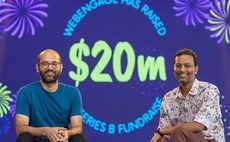
Angels in Asia: Exporting Silicon Valley
Early-stage investors in the US are casting their eyes eastwards as they seek out new partnerships in Asia. But what can these angels offer the region’s start-up community?
In June, a 67-strong group of angel investors, entrepreneurs and deal professionals made a whistle-stop tour of Southeast Asia in search of the latest in disruptive technologies. Dubbed "Geeks on a Plane" (GOAP) the event was hosted by 500 startups, a Silicon Valley-based accelerator that like many others is becoming increasingly engaged in the region.
The tour, which made stops in Singapore, Malaysia, Thailand and Indonesia, has a passenger list that reads like who's who of the San Francisco Bay Area investor community, with former executives from the likes of Amazon, Google and Paypal - of which Dave McClure, 500 Startups' founder, is former director of marketing.
GOAP also coincided with the launch of 500 Startups' first exclusively Southeast Asia-focused fund, 500 Durians. The $10 million vehicle, which makes initial tech investments of $50,000-100,000, underscores Valley veterans' increasing appetite for Asian start-ups. The strategy for 500 Startups in recent years has been to take the US incubator formula and duplicate it elsewhere around the world, particularly in emerging regions such as Asia.
It is just one of a number of accelerator programs with links to Silicon Valley that are eyeing investment in the next big internet and mobile success stories. In emerging Asia, at least, the macroeconomic rationale is clear - GDP growth, which ranges from steady to heady depending on the country, has brought with it an expanding middle class and greater access to technology.
"You see more second-world countries exhibiting lots of first-world consumer characteristics - many places that weren't on people's radar two or three years ago, have made a lot of progress in terms of GDP per capita and their position on the economic stage," says McClure who also recently announced plans to expand 500 Startup's regional footprint in China.
The mobile generation
The data seem to support a case for tech-focused investors looking to Asia. One area Silicon Valley angels are targeting is the mobile internet space, driven by the notion that many users in Asia are getting their first taste of the web through handsets rather than PCs.
According to the Cisco Visual Networking Index, mobile data traffic in Asia will see compound annual growth (CAGR) of 76% between over the next five years, second only to the Middle East on 77%. By 2017 monthly petabyte (1,000 terabytes) usage in Asia will swell to more than 5,000 compared with just 300 today. Meanwhile, AVCJ Research statistics show that seed investment in the region has increased year-on-year since 2009, with deals of under $1 million numbering more than 160 last year, with an aggregate spend of $56 million.
However, it is not only the lure of Asia that is drawing Silicon Valley investors to the region but also the fact that their home market has become overcrowded.
"There is a certain dynamic in the market right now whereby a bunch of US investors have started to take an interest in Australia," says Rick Baker, investment director Australia-based Blackbird Ventures, which counts several Silicon Valley-based players among the LPs in its debut fund. "Super angels and micro-VC guys are looking further afield for deal flow because the US has become very competitive in this space."
A Silicon Valley approach to investing may work in Australia where there is a commonality of language and also in numerous socio-economic and cultural areas. But would it be equally applicable in the rest of Asia and, if so, which strategies are most likely to succeed?
In recent years, the primary means by which angel investors have gained exposure to Asia is through investment in accelerator programs. These often have links with similar initiatives that have already taken root in the US, such as Y Combinator, TechStars, 500 Startups and Silicon Valley Bank.
Each accelerator offers a different degree of mentoring but the basic model is much the same: a selection of start-ups each receive a small amount of money in return for a minority stake; they then enter a program lasting anything from three to six months, which culminates in a demo day for potential third-party investors.
The early movers were in China, with TechStars' Chinese affiliate ChinAccelerator launching in 2010 while Innovation Works, founded by former Google China head Kai-Fu Lee, closed its debut fund at $180 million in 2011. The same year 500 Startups and Silicon Valley Bank also started making investments in the region.
"One of the problems for business angels is there isn't a structured approached by which you can find investment opportunities, so what tends to happen is they are so overwhelmed by people pitching at them that there is no active process by which the ideas get created," explains Hugh Mason, CEO of JFDI.Asia, another TechStars affiliate which was established in Singapore in 2009 and claims to be the longest running accelerator program in Southeast Asia.
JFDI's model is to take a teams of entrepreneurs from idea to investment in 100 days, offering S$15,000 ($11,800) net cash investment, S$100,000 in technical facilities, office accommodation and an introduction to more than 100 active early-stage investors in return for an equity stake. Mason remarks that out of hundreds of pitches JFDI received from local entrepreneurs in the early days only few where investment ready.
Filling a gap
The absence of a systematic process for developing investment-ready businesses was a source of frustration in the community and JFDI responded by setting up HackerSpace. It was intended to serve as a network platform for Singapore's tech community - facilitating an exchange of ideas between entrepreneurs and industry mentors in a social setting.
"We have around 4800 square feet of office space in Singapore and over a third is devoted to socializing and we run a full time café and club," Mason explains. "The key to Silicon Valley is that it turns inventors into investors and founders into funders." He is not alone in expressing this view.
Bernard Moon is co-founder of Sparklabs, an accelerator in based in Seoul that enrolled the second class of start-ups - 10 in total - into its mentoring program in May. The three-month-long program provides investee companies with funding, office space and access to a network of entrepreneurs, venture capitalists and angel investors. The companies operate in a variety of technology segments from e-commerce to mobile applications in Asia and the US.
The use of mentors, predominately from Silicon Valley, is an attempt to recreate the "pay-it-forward" culture - Moon describes this as the "secret sauce" of the Valley.
While mentors are in plentiful supply in the US, there is a shortage in many Asian countries where there have been far fewer successive generations of tech entrepreneurs to pass down experience. In some instances, such as South Korea or Japan, a first generation of entrepreneurs has secured exits and is now in mentoring mode, but they are in short supply.
"If you invest in Series C or even Series D rounds you can sit back and be more passive but if you are investing a company that is less than one year old, hand-holding is important to their success," says Vinnie Lauria, co-founder of Golden Gate Ventures, a Singapore-based venture firm which has ties to Silicon Valley and makes early stage tech-investments.
"If a fund invests in 200 companies and has a hundred fail, then that kind of ratio is not out of the ordinary. But if you didn't have that hand-holding you would have many more failures."
The idea is of transplanting an aspect of Silicon Valley culture into an Asian context, however, is not always so simple. Sparklabs' Moon describes the difficulty of introducing a climate of openness into a culture where ideas tend to be closely guarded and the status industry veterans can be intimidating.
"When we had our first class and we tried to match mentors and entrepreneurs, we found the entrepreneurs did not follow up after an initial meeting because they found it hard to approach these senior industry professionals," he recalls. "So in the second class there had to a bit more structure and we made sure meetings were followed up."
Shorter horizons
In addition to cultural considerations, the investment approach in Asia is different to that of the US. Whereas in Silicon Valley there might be a lot more focus on going after big ideas and far less emphasis on becoming revenue-generative right away, this is not necessarily the case in Asia where there is stronger desire for a quick return on investment.
"The capital needed to get off the ground is relatively inexpensive and there is more of a focus on copycat businesses or at least businesses that are customizable to a region," says 500 Startups' McClure. "There is much less patience for 10-year return cycles with a focus on 3- 5 year cycles instead."
Part of the reason for this is the need to get companies through to Series A stage funding quicker than one would in the US. With fewer seed and angel investors in the region - and also less commercial transparency and weaker legal infrastructure in certain markets - more attention is paid to creating stable business models.
Sparklabs' Moon adds that the ability of company to go global is essential to the decision of whether or not to make an investment. "Whether it is Singapore, Hong Kong or Taipei, we find a lot of markets are too small for us to consider on their own - so the product and the company must target something greater."
He cites Singapore's TrackInvest, an online social investment platform that came out of Sparklabs' first class and launched last month, as an example of a company with the potential to make the jump.
The hope is that as angels become more embedded in Asia's start-up community, business models will mature, developing a greater level of variety as well as the ability to regionalize or globalize and generate scale. It might even turn the established order on its head and start feeding ideas back into Silicon Valley.
For now, though, the consensus among all accelerators is the opportunity in Asia remains largely untapped. "I feel like the accelerator model is still very new - it is only been around five or six year but it is here to stay and it is disrupting early stage investment and it is disrupting the relationship between angels and early stage VCs," says JFDI's Mason.
Latest News
Asian GPs slow implementation of ESG policies - survey
Asia-based private equity firms are assigning more dedicated resources to environment, social, and governance (ESG) programmes, but policy changes have slowed in the past 12 months, in part due to concerns raised internally and by LPs, according to a...
Singapore fintech start-up LXA gets $10m seed round
New Enterprise Associates (NEA) has led a USD 10m seed round for Singapore’s LXA, a financial technology start-up launched by a former Asia senior executive at The Blackstone Group.
India's InCred announces $60m round, claims unicorn status
Indian non-bank lender InCred Financial Services said it has received INR 5bn (USD 60m) at a valuation of at least USD 1bn from unnamed investors including “a global private equity fund.”
Insight leads $50m round for Australia's Roller
Insight Partners has led a USD 50m round for Australia’s Roller, a venue management software provider specializing in family fun parks.







